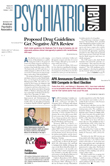Texas Gov. Rick Perry (R) gave children in the State Children's Health Insurance Program (SCHIP) a temporary reprieve in mid-August when he announced a delay in implementation of regulations that would have eliminated coverage for beneficiaries whose parents have overdue premiums.
The new rules, which were scheduled to take effect on August 15, could have affected as many as 20,000 children, according to an August 13 report at<www.kaisernetwork.org>.
Texas's Fiscal 2004 budget, which was implemented July 1, 2003, reduced funds for the SCHIP program by $299 million and increased participating families' copayments and premiums.
Texas children accounted for more than half of this first-ever national decline in SCHIP enrollment. In that state, SCHIP enrollment has declined by more than 149,000 children (29 percent) since the beginning of Fiscal 2004. Most of the reduction in enrollment occurred among children in families with incomes below 150 percent of the federal poverty level (Psychiatric News, September 3).
The Web site<www.startelegram.com> reported on September 2 that the SCHIP cuts had become a campaign issue in Texas's 17th congressional district. Rep. Chet Edwards (D) organized a press conference at which physicians spoke against the budget cuts that began July 1, 2003. Edwards lambasted his opponent, state Rep. Arlene Wohlgemuth (R), who“ was the author of the state's overhaul of the health system. .that resulted in changes to SCHIP.”
Cuts in Medicaid also have become a campaign issue in Mississippi. The new chair of the state Democratic Party, Wayne Dowdy, said, “The Democratic Party is going to concentrate on the issues that affect the real people of Mississippi like health care for the elderly [and] this Medicaid issue.”
He asked for a special legislative session to rescind changes to and cuts in Medicaid.
At the urging of Mississippi Gov. Haley Barbour (R), the state's legislature enacted budget cuts that could result in dropping 65,000 Medicaid beneficiaries from the rolls.
Implementation of the cuts was delayed from July 1 to September 15. The Mississippi legislature passed a resolution in May requesting the governor's permission to “revisit” the legislation (Psychiatric News, August 6).
Policy analyst Barbara Yondorf told attendees at the National Academy for State Health Policy's annual conference in August that a literature review found that the SCHIP and Medicaid programs had been the most effective strategies to address the problem of how those without health insurance can receive needed medical care (see
page 5).
A report released August 31 by the Center for Studying Health System Change (HSC) came to a similar conclusion.
According to “Trends in Americans' Access to Needed Medical Care, 2001-2003,” the “most notable improvements in access to medical care occurred for low-income children, likely reflecting growth in public insurance coverage.”
That report is posted online at<www.hschange.org/CONTENT/701>.▪
